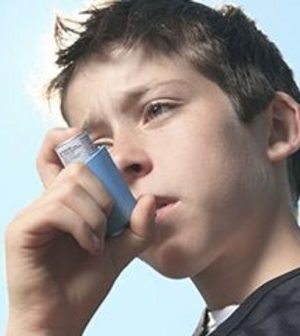- Recognizing the Signs of Hypothyroidism
- 10 Strategies to Overcome Insomnia
- Could Artificial Sweeteners Be Aging the Brain Faster?
- Techniques for Soothing Your Nervous System
- Does the Water in Your House Smell Funny? Here’s Why
- Can a Daily Dose of Apple Cider Vinegar Actually Aid Weight Loss?
- 6 Health Beverages That Can Actually Spike Your Blood Sugar
- Treatment Options for Social Anxiety Disorder
- Understanding the Connection Between Anxiety and Depression
- How Daily Prunes Can Influence Cholesterol and Inflammation
Allergy Treatment Crucial If Your Child Has Asthma

If your child has both allergies and asthma, it’s imperative to treat their allergies to prevent asthma from worsening as they spend more time outdoors, an expert says.
“It’s a time when after a winter when we’re all cooped up inside kids want to go out and play, but the weather is a little variable,” said Dr. Corey Martin, a pediatric pulmonologist at Herman & Walter Samuelson Children’s Hospital at Sinai in Baltimore. “It can tend to get a little warm but still have those cold stretches. Plus, there’s more pollen in the air at this time. These are all triggers for asthma.”
Kids with seasonal allergies are two to seven times more likely to develop asthma later on, Martin noted.
Allergy symptoms can include a runny or congested nose, sneezing, itchy or watery eyes, and generalized itchy skin or hives.
The severity can vary but uncontrolled allergies in a child with asthma can cause more severe asthma. Martin said they’d be more likely to wake up at night with asthma symptoms, and they might need more medicine to control their asthma.
In one study, kids with asthma reported that uncontrolled allergies interfered with their sleep, concentration at school, enjoyment of social activities and participation in sports.
If you think your child has allergies, especially if he or she has asthma, Martin suggested seeing your primary care provider, who may refer you for allergy testing.
There are several asthma triggers: pollen, dust mites, pets, pollution, bugs in the home, fungus spores and cold air, among others.
“It’s important to identify your child’s specific allergens as then you know what can be avoided and what may simply have to be managed,” Martin said in a LifeBridge Health news release.
If allergies are confirmed, your doctor can discuss appropriate treatments, including inhaled steroids and/or oral and nasal antihistamines.
More information
The American Academy of Pediatrics has more on allergies and asthma.
SOURCE: LifeBridge Health, news release, May 28, 2021
Source: HealthDay
Copyright © 2026 HealthDay. All rights reserved.










